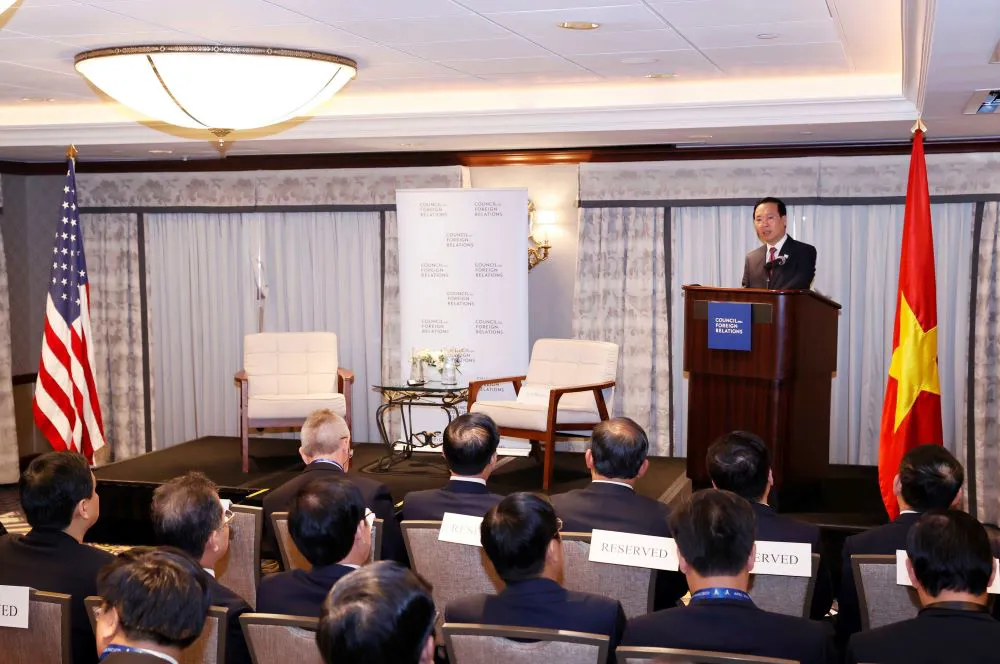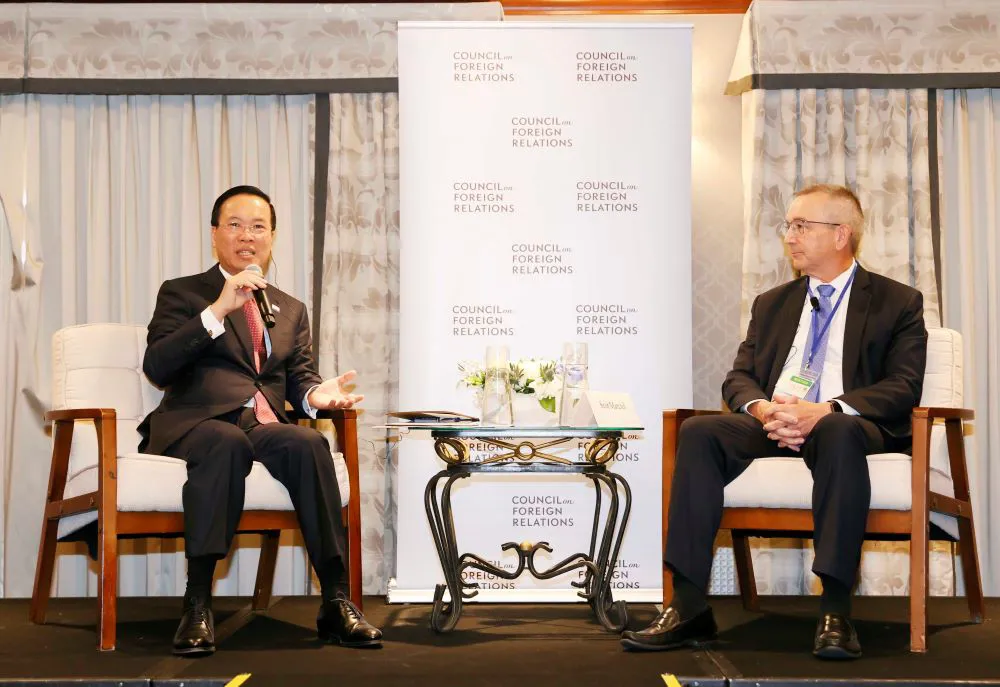Vietnam-US relations is exemplary: State President
Vietnam’s guiding principles in its relations with the United States are to leave the past behind, work through differences, promote common ground, and look to the future.
The US-Vietnam relations have never evolved as it has now, having transformed from former foes to comprehensive strategic partners.
| Vietnam's State President Vo Van Thuong speaks at the Council on Foreign Relations (CFR) in New York on November 15 (local time). Photos: VNA |
It’s unquestionably a model case in the history of international relations in terms of reconciliation and fostering post-war relationships, Vietnamese State President Vo Van Thuong told senior officials from both sides in a speech delivered at the Council on Foreign Relations (CFR) in New York on November 15 (local time).
This outcome is a direct result of the many generations of leaders and citizens of the two nations working together to overcome historical ups and downs, President Thuong said during his week-long trip to the US for the Asia Pacific Economic Cooperation (APEC) Summit in San Francisco on Nov 14-17.
He reiterated Vietnam’s motto in relations with the US is to "put aside the past, overcome differences, promote similarities, look to the future.’ “We stress that it is always crucial to have respect for each other's legitimate interests, mutual understanding, trust in one another, and non-interference in each other's affairs.
According to him, US officials have stated that they back Vietnam’s goal of becoming ‘strong, independent, self-reliant, and prosperous.’
“We view the US as a strategically significant partner in our foreign policy,” said the state president.
| State President Vo Van Thuong and Scott Marciel, an American diplomat and former Principal Deputy Assistant Secretary in the Bureau of East Asian and Pacific Affairs. |
Comprehensive relations
In response to a question from Scott Marciel, an American diplomat and former Principal Deputy Assistant Secretary in the Bureau of East Asian and Pacific Affairs, about the US-Vietnam agreement on semiconductor manufacturing, President Thuong said Vietnam expects that the Joint Leaders’ Statement on Elevating US-Vietnam Relations to a Comprehensive Strategic Partnership to be fully implemented, including semiconductor manufacturing.
Nonetheless, it is necessary for the US to recognize Vietnam as a market economy. This needs to be accomplished through political choices rather than following strict rules. In addition, Vietnam expected the US to train manpower in this industry. On this occasion, a number of US universities signed agreements to train Vietnamese students for the industry.
In terms of trade, Vietnam and the US benefited from an estimated US$142.1 billion in 2022, according to the United States Trade Representative.
Regarding the presence of Vietnamese brand VinFast in the domestic market and in the US, the president highlighted Vietnam’s policies on promoting green technologies in automobile manufacturing and VinFast is a typical Vietnamese business pursuing green growth which is in line with the government’s commitments to net-zero by 2050.
Concerning climate change, the president called for international support, including from the US, for adaptation plans in Vietnam, one of the countries most vulnerable to climate change, especially the Mekong Delta. Vietnam expects concrete solutions and further assistance for the region which is affected by transboundary impacts.
In the talks at CFR, President Vo Van Thuong stressed the role of overseas Vietnamese, especially the more than 2.4 million Vietnamese community in the US and more than 30,000 Vietnamese students in the country.
“They serve as a vital link and a component of the relationship between the two nations. Vietnam values national unity and harmony and believes that Vietnamese nationals living abroad are an integral part of the country,” President Thuong said.
Broader view
At the talks, President Thuong also pointed out Vietnam’s consistent diplomacy which values independence, self-reliance, friendship, and partnership for development based on multilateralism with Vietnam being a reliable and responsible member of the international community.
He also shared Vietnam’s"four-nos" defense policy: no joining military alliances, no siding with one nation against another, no foreign military installations on Vietnamese soil, no using Vietnam as a bargaining chip against other nations, and no using or threatening to use force in international relations.
The two countries’ stance on international agendas was also discussed with the two countries acknowledging the need to abide by international laws, the UN Charter, the 1982 UN Convention on the Law of the Sea (UNCLOS), the effective implementation of the Declaration on the Conduct of Parties in the South China Sea (DOC), and the substantive negotiations of the Code of Conduct of Parties in the South China Sea (COC).
Commenting on the development of the US-Vietnam relations, Scott Marciel tweeted that it has arguably been driven largely by three factors: initially cooperation on war legacy issues, which built trust; then the rapid growth of bilateral trade; and later the development of some common strategic interests.













